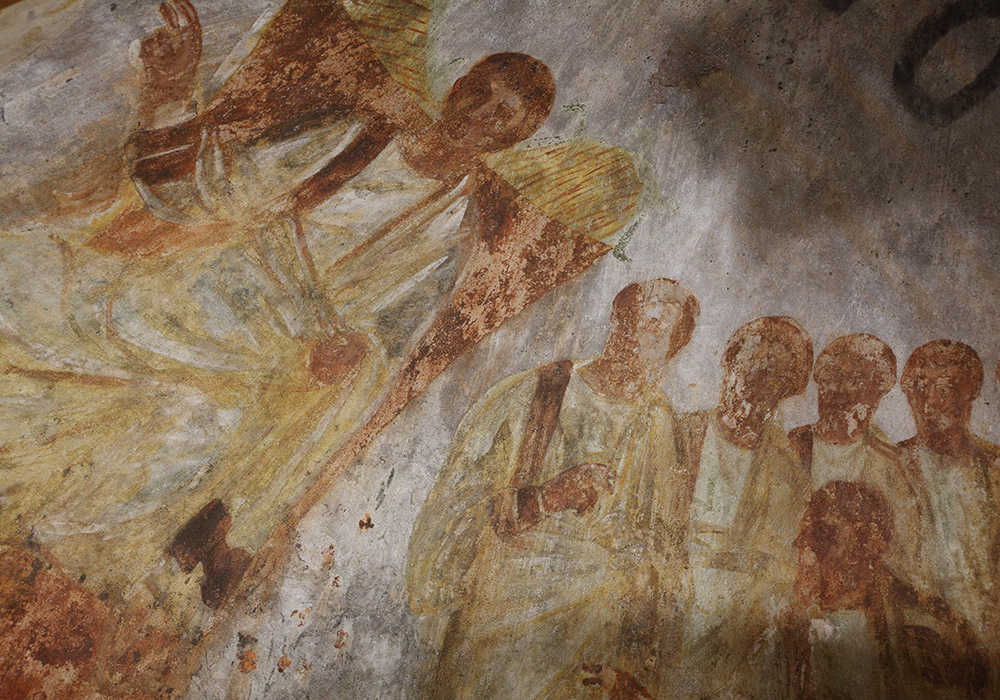
Jesus is seated on a throne with his disciples at his side in this fresco seen during the unveiling of two newly restored burial chambers in the Christian catacombs of St. Domitilla in Rome on May 30, 2017. (CNS/Carol Glatz)
In 1943, Antione de Saint-Exupéry published The Little Prince, the story of a downed pilot and the extraterrestrial prince he came to love. As the little prince shared his life's story, the pilot learned that relationships were the heart of it all. One of the prince's greatest teachers had been an earthly fox. The fox wanted to be tamed, to become friends with someone very different. The fox taught the prince that very different creatures could become friends if they made the effort to be patient and show up faithfully. The fox explained that the time they wasted on each other bound them together. Waiting and watching became their ritual until they realized that they deeply loved one another. They had tamed one another.
What does that have to do with today? This Sunday's readings explore faith in God's loving relationship with us who are God's own. Wisdom tells us that the enslaved Israelites in Egypt awaited their salvation in hope. Amid misery and oppression, they remained convinced of God's love. They shared the blessing the Psalm speaks of: They believed that they belonged to God and put all their hope in the future God was preparing. Like the relationship of babies with their parents, they counted on God whose ways they did not yet know, but in whom they put all their trust.
The Letter to the Hebrews offers us a well-known meditation on Abraham's faith: "the realization of what is hoped for and evidence of things not seen." What an antiquated attitude! We moderns have been trained to know that truth can be proven by objective evidence and repeated experiments. That's why we trust a speedometer and a measuring spoon, but not a dream or a hope.
Abraham's faith was quite unlike that of the people who settled our country. Our settlers and explorers set out to map and master the wilderness, and build the towns and farms they wanted. They knew what they were seeking and were convinced that they could make what they wished of this territory.
Unlike them, Abraham took on a journey he never planned, he moved simply because he was called by God. Trusting in what were vague and improbable promises of progeny and a land "whose architect and maker is God," Abraham put his trust in his creator rather than in what he and his aged wife could make after decades of barrenness. Our ancestors in faith didn't know the science of statistics. They lived with a different mindset.
Our Gospel develops this theme as Jesus says, "Do not be afraid . . . your Father is pleased to give you the kingdom." He went on, "Sell your belongings and give alms."
What were the disciples to make of this? Remember, this teaching comes after Jesus "set his face" toward Jerusalem where he would have his decisive encounter with the people who wished him dead. Jesus had a faith like Abraham's: no calculating, no safety net, no guards to keep him from "striking his foot against a stone" (Psalm 91). All he had was the conviction that the Father called him to do what he was doing. He was so certain of that call that he led his dearest friends into danger with him.
Advertisement
Jesus told the story of the servant who carried on his work whether the master was nearby or out of sight. As we know from his cry on the cross (Mark 15:34), Jesus did not always feel God's closeness. Yet, he continued on, even unto death. "By faith he sojourned." In doing so, he expressed and revealed the loving relationship in which he had hoped all his life. He gave evidence of a love not seen. Moving forward in faith, Jesus allowed God's mysterious will for the world to come to fruition through him.
What is our call from these Scriptures? Perhaps it is to let ourselves be tamed — over and again — by God and those whom God loves. That means we consider the time we "waste" with God and one another our greatest treasure. In Christ, God continually invites us to dream beyond reasonable expectations.
Jesus invites us to be unafraid of the unknown, to trust that what God has to offer us is more than we could ask or imagine. With that faith we can stop worrying or calculating and venture forth, taking the risk to do what we believe is of God, impractical as it may appear to be. When we let go of our securities we can discover the kingdom God is patiently offering us.
